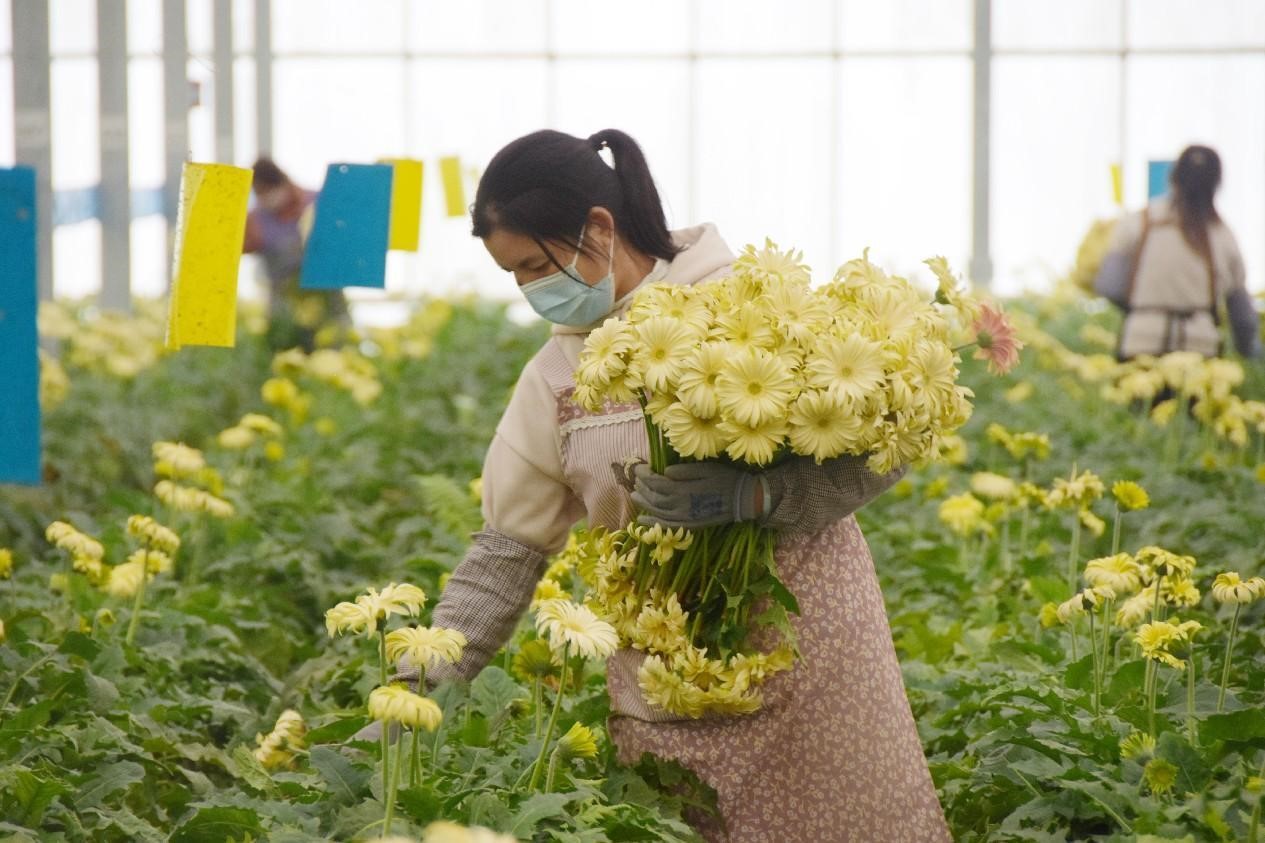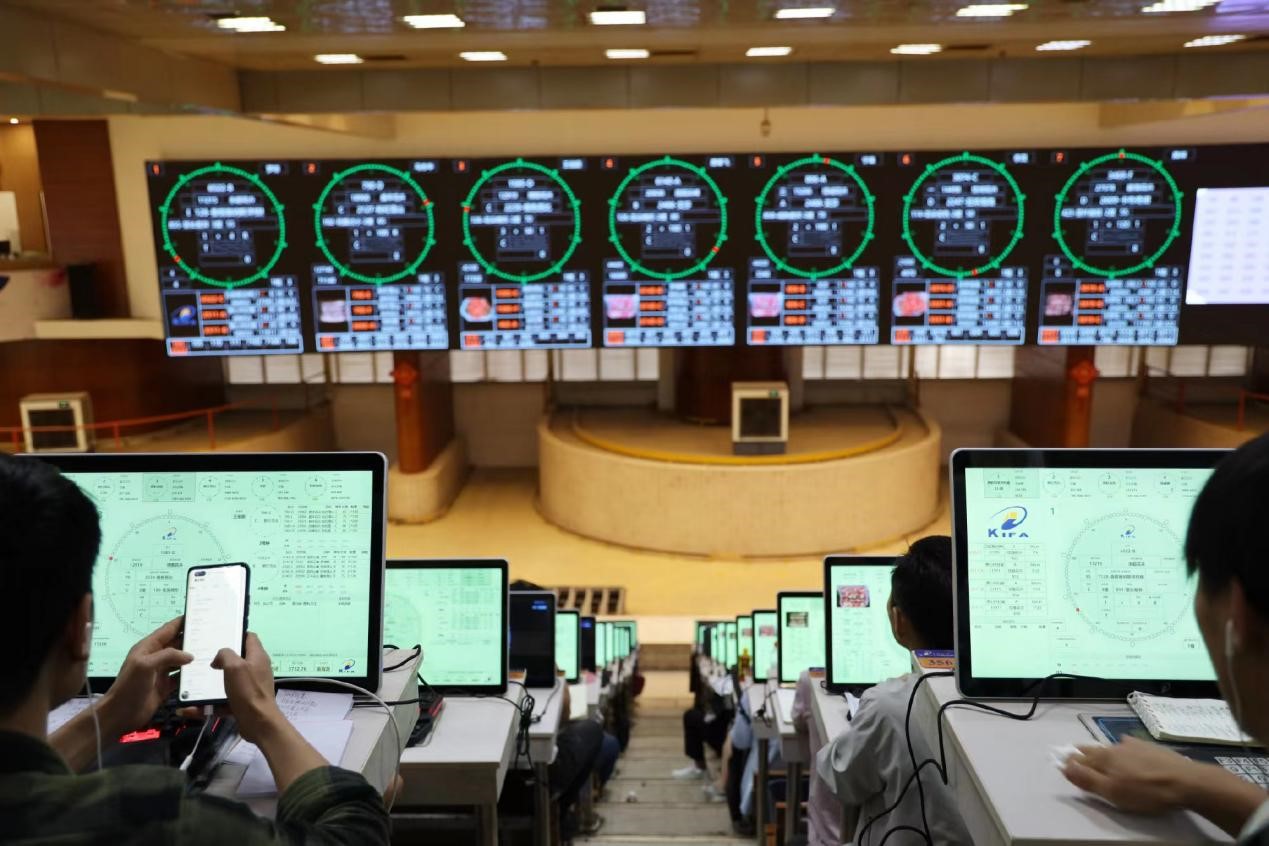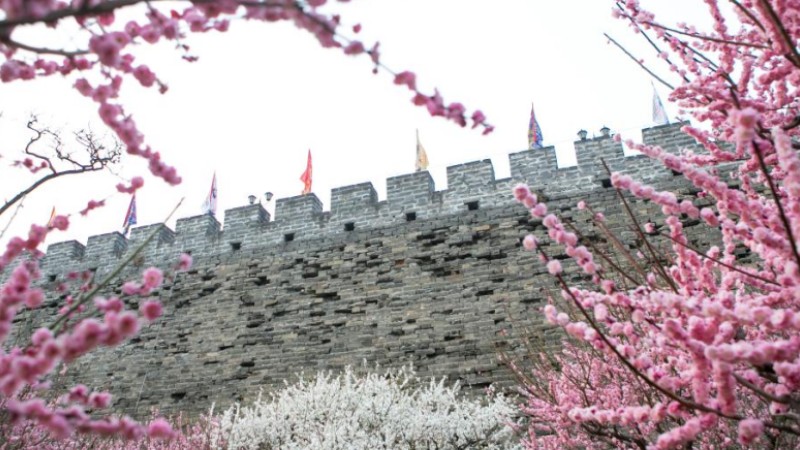Digital technologies promote flower industry in China's Yunnan province

Workers pick flowers in a national-level modern agricultural park in Honghe Hani and Yi autonomous prefecture, southwest China's Yunnan province. (People's Daily Online/Xue Yingying)
Southwest China's Yunnan province, boasting diverse floral germplasm resources and unique climate conditions, is one of the world's three major producers of flowers. Each year, 16.7 billion stems of fresh-cut flowers produced in the province are hitting the market.
The Kunming Dounan Flower Market in Yunnan province, as the only national-level flower trading market in China, sells over 1,600 varieties of flowers under 117 categories every day. Last year, the market sold more than 11 billion stems of fresh-cut flowers, with a turnover of nearly 12.15 billion yuan ($1.76 billion).
The market is home to more than 2,200 flower dealers and 46 logistics firms, which cooperate with over 80,000 flower growers, nearly 12,000 cooperatives, over 10,000 flower agents, and 350,000 wholesale flower markets and flower shops across China, said Duan Lubin with the management committee related to the Kunming Dounan Flower Market, adding that the market is an activator of the entire flower industry of China.
According to him, face-to-face trading, auction and e-commerce are the three major transaction ways at the Kunming Dounan Flower Market.
The Kunming International Flora Auction Trading Center, or KIFA, is located in this market. The 900-seat trading hall is always filled with flower agents, and a transaction is made every four seconds on average. The flower auction there rivals the stock market in tension.
KIFA flower trading index is considered an indicator of flower prices across China, said Zhu Qi, head of the KIFA's planning department, adding that trading prices of the day have a direct impact on the price trend of the national flower market.

Photo shows a busy scene at the Kunming Dounan Flower Market in Kunming, capital of southwest China's Yunnan province. (People's Daily Online/Liang Zhiqiang)
According to Zhu, all the products joining the auctions are evaluated by the center, and the auctions are open and transparent. The index is totally decided by supply-demand variation, Zhu said.
So far, over 3,000 varieties of fresh-cut flowers under some 40 categories have entered the Chinese market as well as over 40 countries and regions including Thailand, Japan, Singapore, Russia and Australia through auctions.
According to Zhu, the KIFA has grown into the second-largest flower auction trading market in the world and the largest in Asia since it was established in 2001. It is also a comprehensive service platform integrating flower standard making, R&D and promotion of new varieties, market information service, as well as technological, financial and logistics services.
While flowers are sold in digital ways, smart technologies are also improving the efficiency of cultivation.
In a national-level modern agricultural park in Yunnan's Honghe Hani and Yi autonomous prefecture, a full-industrial chain platform using digital twins system is employed, covering all flower companies and growers in the park.
Chu Yuan, a technician of the industrial park, told People's Daily that the platform is a cloud-based software that turns real greenhouses into digital ones. It creates a virtual environment for the flowers and simulates their growth data, so as to help growers make better cultivation, Chu said.

Photo shows the Kunming International Flora Auction Trading Center (KIFA) in southwest China's Yunnan province. (Photo from the official page of the KIFA on Weibo)
Grower Zhang Haibei owns chrysanthemum greenhouses that cover 10 mu, or 6,667 square meters in the agricultural park. He is one of the first growers that have connected their greenhouses to the digital platform.
"The agricultural park gave us soil monitors and air sensors, so that we can check the growth of flowers on a mobile application, which tells us when to water and how to fertilize the flowers," Zhang said.
In a Transvaal daisy greenhouse that is seven or eight meters high, various types of sensors, tubes and devices are dotted in the flowers and a large carbon dioxide gas tank is seen outside.
"We employ soilless cultivation. Flowers are grown on coconut fiber that's clean and non-perishable, which is better for flower planting," said Pu Guifei, manager of a Transvaal daisy planting project in the park.
According to Pu, tubes containing nutrient solution are inserted in the coconut fiber. The solution is automatically made based on the growth data of flowers and the environment information in the greenhouses collected by sensors, and sent to the roots of the plants through the tubes, Pu explained.
Thanks to modern equipment and technologies, the agricultural park has witnessed a significant rise in flower orders this year, selling over 6 million stems of fresh-cut flowers and more than 30 million seedlings.
Photos
Related Stories
- In pics: blooming adonis amurensis in Changchun, NE China's Jilin
- Bamboo slips unearthed in China's Yunnan bear high historical value: experts
- Spring in Beijing: Early cheery flowers bloom in Yuyuantan Park
- Fresh-cut flower industry thrives in SW China’s Yunnan
- Cole flowers in full bloom attract tourists in China
Copyright © 2023 People's Daily Online. All Rights Reserved.









